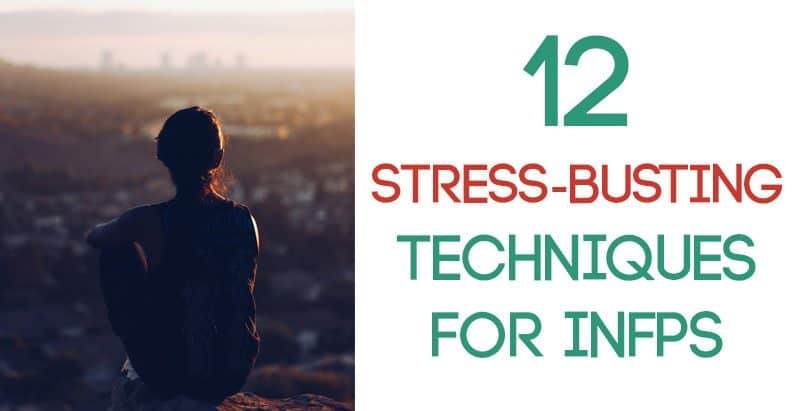12 Stress-Busting Techniques for INFPs
INFPs are some of the most insightful, deep-thinking Idealists of all the personality types. They are quick to listen, slow to speak, and generous in their compassion towards others. They can be iconic writers, groundbreaking musicians, empathetic counselors, or innovative thinkers. Today I want to focus on how INFPs can combat stress in their lives. There are two different types of stress to examine here: regular, everyday stress, and chronic stress that leads to an INFP being “in the grip” of their inferior function; Te (Extraverted Thinking). Both types of stress will result in different reactions and needs from the INFP.
Not sure what your personality type is? Take our new personality questionnaire here. Or you can take the official MBTI® here.

Everyday Stress
Regular, everyday stress is unavoidable to anyone and will normally result in the INFP trying to solve the problem by using their Introverted Feeling or Extraverted Intuition. As a result, the INFP may become simply more INFP-like. They may need to get away and examine their feelings internally, analyzing them, and finding out how to handle something in a way that coincides with their values and emotions. They may try to solve a problem by using Extraverted Intuition; looking for alternative possibilities or an imaginative way to handle a problem.
“Grip” Stress
In the case of chronic, “grip” stress, INFPs may wear out their dominant Fi (Introverted Feeling) and Ne (Extraverted Intuition) and become immersed in their inferior function; Extraverted Thinking. This often happens when INFPs are in an environment that doesn’t suit their natural strengths. Being in an atmosphere of negativity, constant conflict, and criticism will cause them chronic, intense stress since it conflicts with their naturally understanding, compassionate mindset. If they spend way too much time around people, and aren’t able to adequately access their Introverted Feeling, this may also result in a “grip” stress reaction. INFPs can also have a grip reaction when one of their core values is violated. They hold so strongly to their beliefs and their ideals, that when those are stepped on, it can force the otherwise calm INFP into their inferior Extraverted Thinking as a way to retaliate. We could go into a lot more details on grip-related stress, but I really want to focus here on how to manage that stress. I will address the stress itself more in a future post.
How INFPs Act and Feel When “In the Grip” of Extraverted Thinking
When INFPs are in the grip of their inferior function, they will do things that are typically out of character. Suddenly, the INFPs Extraverted Thinking becomes the only way they can think of to handle a problem. As a result, they may become obsessed with fixing perceived problems, and righting wrongs. They may blurt out hostile thoughts or engage in destructive fantasies directed at the people who they feel are the perpetrators of their pain. They also may employ biting sarcasm and cynicism, which is unusual to their normal understanding temperament. They may become aggressively critical to others and themselves, dwelling on all the “facts” necessary to support their overwhelming sense of failure. They will feel lost and confused and try to find logical answers to their problems, but feel like they are searching in the dark. They may become unable to access their feeling or intuitive powers; becoming “stuck” without being able to process information, thoughts, or ideas.
It’s good to remember that an INFP experiencing a “grip” reaction is not at all like their normal, balanced self. INFPs are usually extremely understanding, kind-hearted, and patient. An INFP having a “grip” reaction will seem more like an unhealthy ESTJ. This will be extremely confusing to them, and they will feel out of control and lost. Afterwards, they may feel intense remorse over their reaction and experience – at that point, it is vitally important for their loved ones to show them acceptance, kindness, and the kind of compassion INFPs are so famous for showing others.
What Makes INFPs Stressed?
– Rigidity in rules and timelines
– Having their values violated
– Not enough time alone. Too much socializing.
– Too many demands on their time
– Small-talk
– A lack of authenticity from others
– Having their creativity stifled
– Having to focus too extensively on sensory/concrete details
– Criticism or confrontation
Not sure what your personality type is? Take our new personality questionnaire here. Or you can take the official MBTI® here.
12 Ways INFPs Can Get Relief From Stress
1 – Get Some Alone Time
INFPs can quickly wear out if they are constantly socializing or dealing with people. During everyday stress or “grip”-related stress, getting away from it all is key. The INFP should get some space to themselves, quiet their minds, and just let the feelings pass through them until they start to feel more like themselves and calmer.
2 – Exercise
Many INFPs report feeling better if they can go out for a jog, ride a bike, or take a walk through nature. Being able to do this helps the INFP to escape their inferior Thinking function and use the tertiary Sensing function as a pathway back to complete equilibrium. Many times people can escape a “grip” reaction by using their tertiary function as a pathway back to balance and calmness. For the INFP, using their tertiary Sensing is a great way to do this.
3 – Read a Book
INFPs are imaginative and creative people who love to explore alternate worlds and ideas. When they are experiencing everyday or “grip” stress, being able to escape into a story can really help. This is a way for them to access their rich imaginative intuition without having to come up with ideas on their own. They can relax and open up that part of their mind by simply reading a book, and it can truly help them to feel balanced and optimistic again.
4 – Just Say “No” to Extra Responsibilities
Deadlines and a full schedule can be a nightmare for an INFP; especially one who’s already stressed out. INFPs under stress will feel better if they can look at their schedule and cancel any non-essential tasks. They may feel bad doing this, especially if they are canceling something to do with a friendship or relationship, but if they are experiencing extreme stress they really just need to be able to say “Sorry! Can’t do this right now!” and take a step back to recuperate.
5 – Talk to Someone Who Will Empathize and Listen Without Trying to “Fix” It
After a period of alone time, INFPs are often helped by talking to a friend or family member who can listen without trying to jump in and “fix” the problem. In stressful situations, INFPs want someone who will listen and empathize; not someone who will try to solve the problem. They may even want to vent their anger and criticism that has become so pent up while they were experiencing their “grip” reaction. In this case, they want someone who will listen and have compassion; someone who will understand that the INFP is not in their normal mental zone, and needs understanding. INFPs usually feel bad after they’ve had a “grip” reaction, and having a friend who can be understanding and just listen without reacting or judging is very important.
6 – Journal
Many INFPs mention writing and journaling as an effective way of managing stress. If they are experiencing everyday stress, they can get their feelings out on paper, come up with imaginative ways to solve the problem, or write about how the experience is making them feel. If they are experiencing grip-related stress, they can write out all their negativity on paper and get it out that way.
7 – Take a Hot Bath
Taking a warm bubble bath gives the INFP two things they desperately need when under stress; alone time and a sensory experience. The INFP can get some peace and quiet to think things through, and they can access their tertiary Sensing side by enjoying the warmth and relaxation the bath gives them. Both of these things can help them to balance out their functions and feel more peaceful again.
8 – Listen to Music
Music gives the INFP a way to escape their current feeling of being lost and without answers, and lets them just feel whatever emotions the music lends them. Music also allows them to access their tertiary Sensing side and lets them relax more and just take in the musical experience. The type of music INFPs will enjoy varies from person to person; some INFPs mentioned blasting loud, industrial music as a way to regain equilibrium; others enjoyed peaceful indie music. Either way, INFPs are greatly affected by music as a way to handle stress and manage their feelings.
9 – Spend Time with a Pet
Dominant Introverted Feelers, like ISFPs and INFPs, often have a soft spot for pets. I’m sure there are some INFPs who aren’t fond of pets, but the majority seem to have a deep love for their furry friends. Many INFPs mention spending time with their pet as a great way to relieve stress. Taking their dog for a walk, snuggling up on the couch with a kitten, or throwing a ball to their ferret. These kinds of activities let the INFP engage their Introverted Feeling side in a solitary way where they are not forced to deal with other people barging into their thought process or making them handle things before they’re ready.
10 – Meditate or Pray
INFPs, and nearly all Idealist personality types, are greatly affected by meditation and/or prayer. Being able to completely zone out from people and responsibilities and focus on finding peace and calm or spiritual harmony is an excellent way to regain balance and perspective.
11 – Look at, or Create Art
INFPs are greatly affected by beautiful imagery and the stories behind various pieces of artwork. Looking at artwork or creating artwork helps them to engage their tertiary Sensing side, and it also helps them to access their intuition and feeling, which may become more pronounced because of the emotions a piece of artwork can provoke.
12 – Have Sex
Okay, I don’t usually talk a lot about sex on my blog – but this one came up a lot! After a period of alone time and returning to balance, many INFPs mentioned sex as a great way to “get out of their heads” and get back to feeling like themselves again. Again, sex can open up the tertiary Sensing side of the INFP, and can be an effective way of re-balancing their functions and getting away from critical thoughts.
The INFP and Stress
Find out more about your personality type in our eBook, Discovering You: Unlocking the Power of Personality Type.
What Do You Think?
Do you have some great stress-relief tips for INFPs? What do you do to get control of your emotions and feelings? I’d love to hear from you in the comments!
Find out more about your personality type in our eBooks, Discovering You: Unlocking the Power of Personality Type, The INFJ – Understanding the Mystic, and The INFP – Understanding the Dreamer. You can also connect with me via Facebook, Instagram, or Twitter!
This post contains affiliate links. I only recommend products I truly believe in.
Check out more articles!
Getting to Know the INFP’s Shadow Functions
10 Things You Should Never Say to an INFP
Subscribe to Our Newsletter

Want to discover more about personality type? Get the inside scoop with Susan Storm on all things typological, along with special subscriber freebies, and discounts on new eBooks and courses! Join our newsletter today!















I’m not sure how to communicate sustained applause through text. Writing has finally failed me.
I can definitely vouch for a good chunk of these, especially exercise. I always found it weird that even though physical exertion is normally an inconvenience for me, my daily walks (and rewalks, and rerewalks) always feel like a pallet cleansing. I never even THOUGHT that it might be because I’m putting focus on my sensing, that’s a really wonderful insight.
Thanks so much for writing this. Your blog has pretty much been my favorite thing ever for the past month. I will become an MBTI expert yet!
Well, “expert” by the standards of “exhaustive nerd” anyway.
Awww, thanks so much!! That means a lot to me 🙂 I am so glad that you found it relateable! As an INFJ I also get relief through taking solitary walks – even though I really hate strenuous exercise (I’m kind of a wimp, physically speaking). When I learned that all types can often get out of a grip reaction by working their way up their functions through the tertiary function that REALLY helped me a lot. For me as an INFJ, utilizing my Ti (Introverted Thinking) helps OR finding better, healthier ways to utilize my sensing on a day-to-day basis. I am so glad you enjoy my blog, it’s such an encouragement to me 🙂 I am right there with you about being an “exhaustive nerd” 🙂 I obsess over MBTI way too much.
Wow. This is incredible. As an INFP whose previous job turned out to be the perfect environment to put me in the “grip” daily for about 4 years, I can vouch for almost every word on this page. It’s so correct I almost cried. I feel so validated. It’s the one time an INFP is glad to know they aren’t unique– because the pain is unbelievable, and if we know why the process of the “grip” makes sense, then the burden lightens.
I’m so sorry you had to deal with a job that put you in that kind of chronic stress day in and day out! Thanks so much for reading my post and sharing your thoughts and experience with me! I am so glad you feel validated! Learning about personality type and stress has been a great way for me personally to understand myself and others better. I’m so glad if it can help anyone else too!
That’s exactly how I felt. Almost every word resonated with what I went through a few months back. My partner couldn’t understand why I behaved in such a way that I had never acted before in our 10 years of marriage. The work was too stressful and I was away from my family. I found a “friend” who would care less about how I felt but nevertheless listened to me without being judge mental… My wife thinks I cheated on her. Its not that I cheated on her but all I wanted someone to hear me out. As private as I was, now everyone knows about my “affair”. I feel so violated. I have shut myself down since. Not sure how and when will I come out. Thanks for the article though. Beautifully written!
Hi again Susan~I was wondering in your opinion who goes best with an INFP? Considering they are at their most healthy states. I’ve often heard ENFJ or ENTJ (NO thank you to that one!!) or even INTJ. What are your thoughts and feelings about this subject for an INFP? And again, thanks for another lovely, spot-on article!
Hi there! I’m so sorry I’m late in responding to this comment – my site has had some issues for several days and I was unable to access the comments or make any posts. Can I research your question a little bit and get back to you? I have a few books that address type and relationships and I would love to consult those before answering you. Thank you so much for contacting me and I will respond soon with thoughts on a good InFp match!!
Susan,
Was wondering what an INFPs recently out of long-time period of using Extraverted Thinking should do in order to reach out to another that may have had the same phase, for the same amount of time. And show them who they really are. This is kind of…the kind of a thing where you’d want to be pals with the person, or whatever. 🙂 Thank you.
As an INFP currently in the middle of a grip stress, I can vouch for all of these. Even the sex one as a semi-narcissistic reconnecting. Yet, I can tell when the next day makes additional demands and I lapse back into ET mode or fake NT as is required by the current needs and deadlines. I find myself longing for getting in touch with my touchstone friend (#5 who will listen and reflect and help me walk through it) or walking with my dog or doing Tai Chi (pet, meditative and exercise) more. Spot on…
Thank you Stephen for sharing your thoughts on this! I am so sorry that you are dealing with grip stress. Is it because of your work environment? You don’t have to say of course. I hope that things will get easier over time! I’m glad you have a good friend and a dog to keep you company if needed! I wish you all the best!
Oh, so spot on! I ‘ve just found your site and skimmed, rather than read, because I know I need to sleep at the moment LOL but will be back to check this more solidly as what I’ve read could have been from a very personal diary …. very accurate for me. 🙂 Thank you.
What does an INFP do when they are not physically able to exercise? I understand the value of it and wish I could do more, but with lifelong RA and several replaced joints, strenuous exercise is out.
Carolan, working with debilitating diseases like RA and artificial joints is tough for any type. I’m and INFP who has always felt out of funk when I haven’t been able to exercise. However, as an INFP with Ankylosing Spondilitis, Osteoarthritis, Fibromyalgia and an artificial ankle, I’ve had to figure out how to “quench my thirst” for physical activity without causing episodic debilitation. Susan doesn’t focus on the strenuous exercise aspect of it but instead it’s about escaping “their inferior Thinking function and use the tertiary Sensing function as a pathway back to complete equilibrium.” So it’s really about the sensing aspect of physical activity. I used to work out for 2 hours a day. I’ve had to accept that not only can I not work out that long anymore, I also can’t do strenuous exercise. So I thought I was done for. But what I’ve discovered (and I didn’t realize it was because of the sensory aspect until reading this blog) is that even small exercises can help destress. Try Yoga or Pilates. Even just stretching for a while can sometimes destress. I bought one of those foam rollers and on bad days when even doing simple exercise is difficult, rolling on the foam roller has helped destress. It’s a world away from the stress. So don’t give up on exercise as a stress reducer–try it in moderation.
“An INFP having a “grip” reaction will seem more like an unhealthy ESTJ. This will be extremely confusing to them, and they will feel out of control and lost. Afterwards, they may feel intense remorse over their reaction and experience”
This is so true! I had to live with a sexist and false (which I hate) brother in law for months abroad and I became depressed for like a year. Everything I used to enjoy was not fun anymore and I hated myself, I felt like a different person and I didn’t wanted to talk with close friends because I was afraid they would hate me like I did. Now I’m healthy and weirdly glad I went through that situation because it made me realize a lots of things.
Thanks for the article! I love your blog 🙂
I am so sorry you had to go through that experience! I know, as an INFJ, I went through an unhealthy ESTP-like phase in my life that was incredibly difficult, so I know how hard it is to struggle through such a long period in a grip reaction. I am so glad you are feeling better now! I’m also glad you’re enjoying my blog! Thank you! 🙂